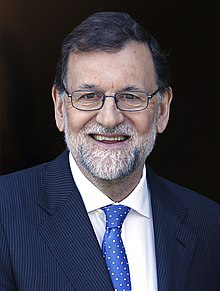

Prime Minister of Spain
27 March 1955 Santiago de Compostela, Spain
-
21 December 2011 – 1 June 2018
Former Prime Minister of Spain In this Spanish name, the first or paternal surname is Rajoy and the second or maternal family name is Brey. The Most Excellent Mariano RajoyPrime Minister of SpainIn office 21 December 2011 – 1 June 2018MonarchJuan Carlos I Felipe VIDeputySoraya Sáenz de SantamaríaPreceded by José Luis Rodríguez ZapateroSucceeded by Pedro SánchezPresident of the People's PartyIn office 2 October 2004 – 21 July 2018DeputyÁngel AcebesMaría Dolores de CospedalPreceded by José María AznarSucceeded by Pablo CasadoLeader of the OppositionIn office 17 April 2004 – 21 December 2011MonarchJuan Carlos IPrime Minister José Luis Rodríguez ZapateroPreceded by José Luis Rodríguez ZapateroSucceeded by Alfredo Pérez RubalcabaSecretary General of the People's PartyIn office 4 September 2003 – 2 October 2004PresidentJosé María AznarPreceded by Javier ArenasSucceeded by Ángel AcebesFirst Deputy Prime Minister of SpainIn office 28 April 2000 – 4 September 2003Prime Minister José María AznarPreceded by Francisco Álvarez CascosSucceeded by Rodrigo RatoSpokesperson of the GovernmentIn office 10 July 2002 – 4 September 2003Prime Minister José María AznarPreceded by Pío Cabanillas GallasSucceeded by Eduardo ZaplanaMinister of the PresidencyIn office 10 July 2002 – 4 September 2003Prime Minister José María AznarPreceded by Juan José LucasSucceeded by Javier ArenasIn office 28 April 2000 – 28 February 2001Prime Minister José María AznarPreceded by Francisco Álvarez CascosSucceeded by Juan José LucasMinister of the InteriorIn office 28 February 2001 – 10 July 2002Prime Minister José María AznarPreceded by Jaime Mayor OrejaSucceeded by Ángel AcebesMinister of Education and CultureIn office 19 January 1999 – 28 April 2000Prime Minister José María AznarPreceded by Esperanza AguirreSucceeded by Pilar del Castillo (Education, Culture and Sport) Minister of Public AdministrationsIn office 6 May 1996 – 19 January 1999Prime Minister José María AznarPreceded by Joan LermaSucceeded by Ángel AcebesVice President of GaliciaIn office 4 November 1986 – 26 September 1987PresidentXerardo Fernández AlborPreceded by Xosé Luis BarreiroSucceeded by Xosé Luis BarreiroMember of the Congress of DeputiesIn office 20 November 1989 – 15 June 2018ConstituencyMadridIn office 7 July 1986 – 4 December 1986ConstituencyPontevedra Personal detailsBornMariano Rajoy Brey (1955-03-27 ) 27 March 1955 (age 66) Santiago de Compostela, SpainPolitical partySpanish National Union (1970s) People's Alliance (Before 1989) People's Party (1989–present) Spouse(s)Elvira Fernández Balboa (m. 1996)Children2ParentsMariano Rajoy Sobredo Olga Brey LópezAlma materUniversity of Santiago de CompostelaSignatureWebsiteOfficial website Mariano Rajoy Brey (Spanish: ; born 27 March 1955) is a Spanish politician who served as Prime Minister of Spain from 2011 to 2018, when a vote of no confidence ousted his government. On 5 June 2018, he announced his resignation as People's Party leader. He became Leader of the People's Party in 2004 and Prime Minister in 2011 following the People's Party landslide victory in that year's general election becoming the sixth President of the Spanish Government. The party lost its majority in the 2015 general election, but after that election ended in deadlock, a second election in 2016 enabled Rajoy to be reelected Prime Minister as head of a minority government. Rajoy was a Minister under the José María Aznar administration, occupying different leading roles in different Ministries between 1996 and 2003, and he also was the Deputy Prime Minister between 2000 and 2003. He was the Leader of the Opposition between 2004 and 2011 under José Luis Rodríguez Zapatero's government. Rajoy's first term was heavily marked by the Spanish financial crisis and oversaw a major restructuring of the Spanish financial system as well as a major labour reform. The financial crisis peaked with a bailout of the Spanish banking system in June 2012. Unemployment in Spain peaked at 27% in 2012, which led to an initial drop of the People's Party in the polls, which was aggravated by the revelations of a series of corruption cases that seriously damaged the party's reputation. This, among other factors, led to a profound shift in the Spanish party system, with the rise of new political parties from the left and the right: Podemos and Citizens. The 2015 general election led to a parliamentary configuration that made the formation of a government very difficult; as a result, Spain was without a government for over six months and new elections were held in June 2016. Rajoy was finally appointed Prime Minister with the support of the Citizens party and the abstention of the Spanish Socialist Workers' Party. Rajoy's second term was marked by economic recovery and a drop in unemployment and the challenge of stagnating salaries. Rajoy also oversaw the 2017–18 Spanish constitutional crisis marked by the Catalan independence referendum of 2017 and the Catalan unilateral declaration of independence on 27 October 2017 that led to the imposition of direct rule in Catalonia. At 14 years and 146 days, Rajoy was the longest-serving Spanish politician in the Government of Spain since the Spanish transition to democracy, having held ministerial offices continuously from 1996 to 2004 and from 2011 to 2018.

We use cookies
We use cookies and other tracking technologies to improve your browsing experience on our website, to show you personalized content and targeted ads, to analyze our website traffic, and to understand where our visitors are coming from. Privacy Policy.